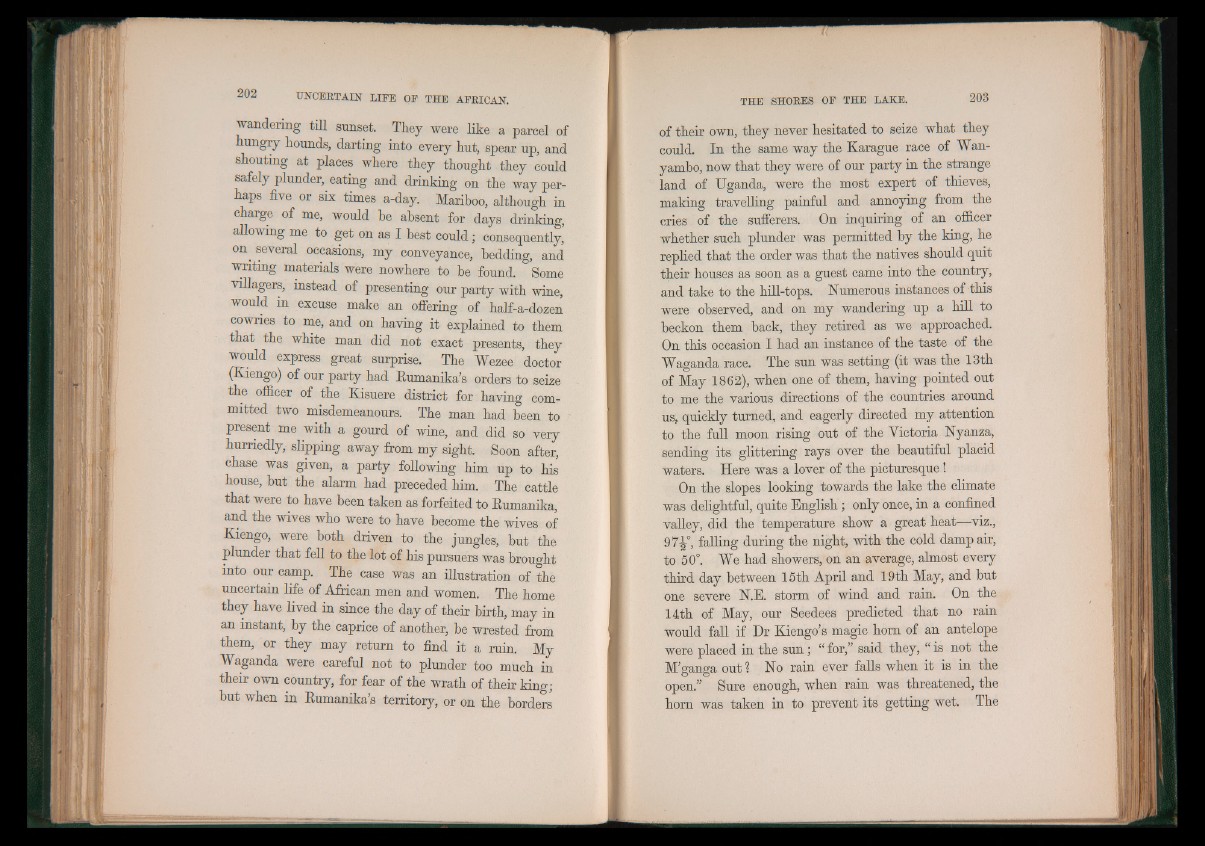
wandering till sunset. They were like a parcel of
hungry hounds, darting into every hut, spear up, and
shouting at places where they thought they could
safely plunder, eating and drinking on the way perhaps
five or six times a-day. Mariboo, although in
charge of me, would be absent for days drinking,
allowing me to get on as I best could; consequently,
on several occasions, my conveyance, bedding, and
writing materials were nowhere to be found. Some
villagers, instead of presenting our party with wine,
would in excuse make an offering of half-a-dozen
cownes to me, and on having it explained to them
that the white man did not exact presents, they
would express great surprise. The Wezee doctor
(Kiengo) of our party had Eumanika’s orders to seize
the officer of the Kisuere district for having committed
two misdemeanours. The man had been to
present me with a gourd of wine, and did so very
hurriedly, slipping away from my sight. Soon after,
chase was given, a party following him up to his
house, but the alarm had preceded him. The cattle
that were to have been taken as forfeited to Rumanika,
and the wives who were to have become the wives of
Kiengo, were both driven to the jungles, but the
plunder that fell to the lot of his pursuers was brought
into our camp. The case was an illustration of the
uncertain life of African men and women. The home
they have lived in since the day of their birth, may in
an instant, by the caprice of another, be wrested from
them, or they may return to find it a ruin. My
Waganda were careful not to plunder too much in
their own country, for fear of the wrath of their king;
but when in Rumanika’s territory, or on the borders
of their own, they never hesitated to seize what they
could. In the same way the Karague race of Wan-
yambo, now that they were of our party in the strange
land of Uganda, were the most expert of thieves,
making travelling painful and annoying from the
cries of the sufferers. On inquiring of an officer
whether such plunder was permitted by the king, he
replied that the order was that the natives should quit
their houses as soon as a guest came into the country,
and take to the hill-tops. Numerous instances of this
were observed, and on my wandering up a hill to
beckon them back, they retired as we approached.
On this occasion I had an instance of the taste of the
Waganda race. The sun was setting (it was the 13th
of May 1862), when one of them, having pointed out
to me the various directions of the countries around
us, quickly turned, and eagerly directed my attention
to the full moon rising out of the Victoria Nyanza,
sending its glittering rays over the beautiful placid
waters. Here was a lover of the picturesque!
On the slopes looking towards the lake the climate
was delightful, quite English; only once, in a confined
valley, did the temperature show a great heat—viz.,
97-^°, falling during the night, with the cold damp air,
to 50°. We had showers, on an average, almost every
third day between 15th April and 19th May, and but
one severe N.E. storm of wind and rain. On the
14th of May, our Seedees predicted that no rain
would fall if Dr Kiengo’s magic horn of an antelope
were placed in the sun; “ for,” said they, % is not the
M’ganga out ? No rain ever falls when it is in the
open.” Sure enough, when rain was threatened, the
horn was taken in to prevent its getting wet. The